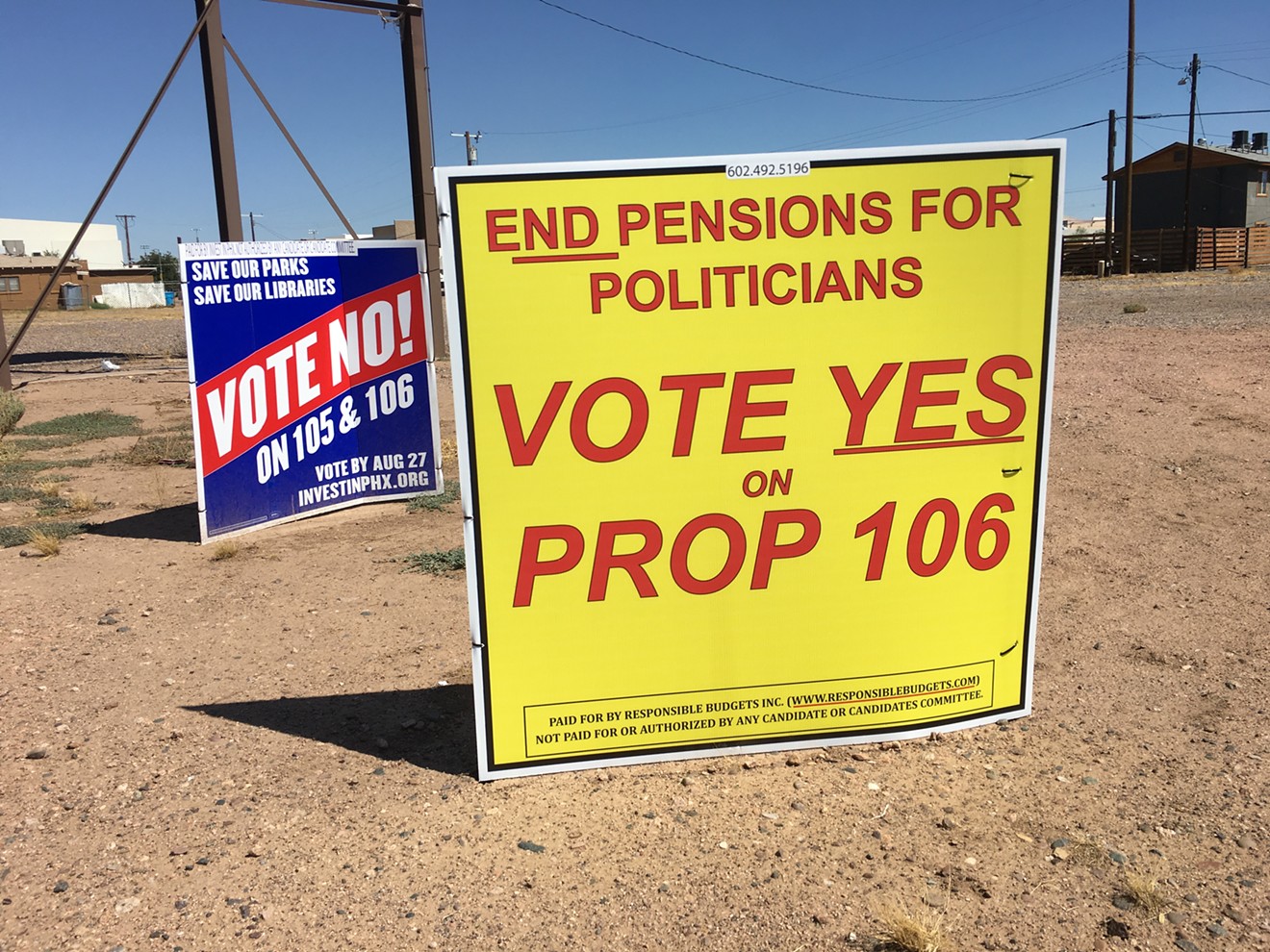In recent weeks, paid canvassers have gone door-to-door in Phoenix to round up support for Proposition 106, the complicated ballot initiative that would cut city spending on services like libraries and parks to help pay down the city's pension debt.
Canvassers asked each resident a series of questions, according to a copy of their script obtained by Phoenix New Times: Do you support Proposition 106? Will you vote for 106? Do you need a ride to the polls on election day, August 27?
Nothing out of the ordinary for an election campaign.
Then came question number four. If someone expressed support for Proposition 106, they also got hit with an unusual cash offer in exchange for helping them advertise the ballot initiative on social media.
"Would you be open to sharing a video we have made and tagging us on your social media account if we gave you $15?" reads the fourth question on the Proposition 106 canvassing script.
Chuck Warren — one of the Wyoming-based political operatives who helped organize the ballot initiative under a political committee called Responsible Budgets — confirmed to New Times that the Proposition 106 campaign paid Phoenix residents to post a video ad on their social media accounts.
Warren's tactic was a clever attempt at creating the illusion of grassroots activism supporting Proposition 106, a strategy known in politics as "astroturfing." After all, social-media users who posted the Responsible Budgets video would presumably not disclose to their friends and families that they were paid agents.
The strategy was a flop. Only three people pocketed the $15 in exchange for turning their social media pages into advertising, according to Warren.
"It was a waste," Warren said in a phone interview. "A big swing and a miss."
Arizona election law does not specifically address the scenario of political campaigns giving people money in exchange for advertising on personal social media accounts. But the Responsible Budgets campaign managers appear to have used a loophole in the law to hide their hand in the social media strategy.
State statutes require campaigns to disclose their involvement on most political advertising, such as mailers, billboards, and radio and television commercials. Text messages and social media posts supporting a campaign, however, fall under a category of "expenditures" that are exempt from the disclosure rule.
Tom Collins, executive director of the Arizona Citizens Clean Elections Commission, said the law is intended to account for the assumed organic nature of social media posts. One might expect that most people aren't getting paid to post on sites like Twitter, Facebook, and Instagram.
"What it seems to me is if they’re paying them, and there’s no disclosure, that they’re taking advantage of a law that assumes people post on social media spontaneously," Collins said.
Early voting is underway for Proposition 106. If more people vote "yes" on the initiative than "no," the city of Phoenix would be required to conduct annual assessments of pension debt and cap new spending on most city services if pensions are not 90 percent funded. The initiative would also end pensions for City Council members.
Supporters of the measure, including Phoenix City Council member Sal DiCiccio, say significant belt-tightening is necessary to meet the city's pension obligations. Opponents organized under a committee called Invest in PHX say the proposition constrains the city's growth and imposes draconian cuts on necessary services.
[
{
"name": "Air - MediumRectangle - Inline Content - Mobile Display Size",
"component": "18478561",
"insertPoint": "2",
"requiredCountToDisplay": "2"
},{
"name": "Editor Picks",
"component": "16759093",
"insertPoint": "4",
"requiredCountToDisplay": "1"
},{
"name": "Inline Links",
"component": "17980324",
"insertPoint": "8th",
"startingPoint": 8,
"requiredCountToDisplay": "7",
"maxInsertions": 25
},{
"name": "Air - MediumRectangle - Combo - Inline Content",
"component": "16759092",
"insertPoint": "8th",
"startingPoint": 8,
"requiredCountToDisplay": "7",
"maxInsertions": 25
},{
"name": "Inline Links",
"component": "17980324",
"insertPoint": "8th",
"startingPoint": 12,
"requiredCountToDisplay": "11",
"maxInsertions": 24
},{
"name": "Air - Leaderboard Tower - Combo - Inline Content",
"component": "16759094",
"insertPoint": "8th",
"startingPoint": 12,
"requiredCountToDisplay": "11",
"maxInsertions": 24
}
]











